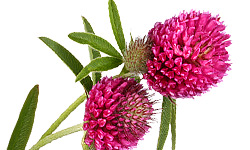What Is Red Clover?

Red clover (Trifolium pratense) is a perennial herb that grows wild in meadows throughout Europe, Asia, and more recently, North America. The flowers at the end of the branched stems are considered to be the source of its medicinal properties.
What Is Red Clover Used for?
Traditionally used as a cold remedy, red clover has also been used in folk medicine for cough, chronic skin disorders (like eczema and psoriasis), digestive and gastrointestinal disorders, allergies, and headaches.
In modern day, red clover is used primarily for relieving menopause symptoms. In fact, red clover is one of the richest sources of phytoestrogens and can overcome several menopause symptoms, such as hot flashes and mood swings, and it may even help in the prevention of osteoporosis.
Red clover relieves these menopause symptoms:
- Osteoporosis
- Skin inflammation and itchiness
It is important for women to get informed about how this herb works before using it.
How Red Clover Works
Red clover is a source of many valuable nutrients, including calcium, chromium, magnesium, niacin, phosphorus, potassium, thiamine, and vitamin C. It is also considered to be one of the richest sources of isoflavones, a phytoestrogen also found in soy.

Red clover works in the body by raising the amount of estrogen when levels are low. The herb can accomplish this task because it contains phytoestrogens, which are herbal compounds that have a chemical structure very similar to estrogen. In other words, red clover replaces the natural human hormones with plant compounds to raise the amount of estrogen in the body.
Concerns about red clover
Red clover has been recently scrutinized by health professionals because phytoestrogens can stimulate the development and growth of breast cancer cells that have estrogen receptors.
In any case, you should get informed on the benefits and side effects of this phytoestrogenic herb before using it in order to know if it would be suited to your needs.
Benefits and Side Effects of Red Clover
Before using red clover, women should be informed of the risks and benefits this phytoestrogenic herb has.
Red clover benefits

Red clover relieves menopause symptoms. Red clover can be effective in the short-term relief of hot flashes and mood swings.
Red clover is a good alternative to hormone replacement therapy (HRT). Red clover can supply the body with a plant form of estrogen that is similar to natural estrogen, though weaker. Red clover intake has almost the same benefits as HRT with a less expensive cost.
Red clover has several health benefits besides relieving symptoms of hormonal imbalance. Red clover is also used for improving blood flow and slowing down bone loss.
Red clover side effects
Red clover can increase the risk of breast cancer and strokes. Phytoestrogens in red clover may accelerate the spread of breast and uterine cancer cells that have estrogen receptors, as well as increase the risk of blood clots and strokes.
Red clover has contraindications with some medications. Red clover must not be combined with birth control pills. It should not be used by women who are taking anticoagulants or blood thinners. It must also be avoided by people with breast cancer. Red clover has made animals who have consumed large amounts infertile; it is not known whether it has the same effect on people.
Conclusions about Red Clover
Red clover is very effective for treating menopause symptoms, and it's reasonably priced compared to HRT. However, this herb has been recently called into question because it adds artificial hormones to the body. By doing this, it can increase the risk of breast cancer.
On the other hand, you can find other alternative treatments that are just as effective as red clover, but have virtually no side effects. For example, hormone-regulating herbs are a great alternative for treating hormonal imbalance.
Hormone-regulating Herbs for Hormonal Balance
Non-estrogenic herbs have nutrients that nourish the endocrine system to balance hormone levels naturally, avoiding side effects. It means that Non-estrogenic herbs make the body itself produce the needed hormones. Click here to read more about hormone-regulating herbs for balancing hormone levels.